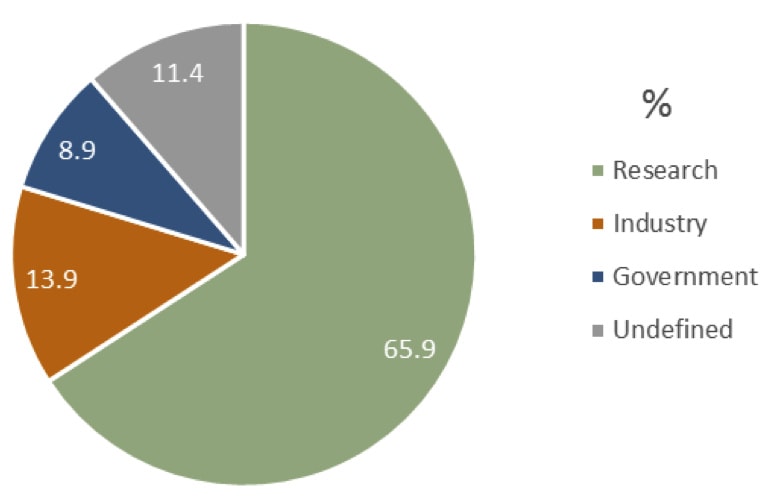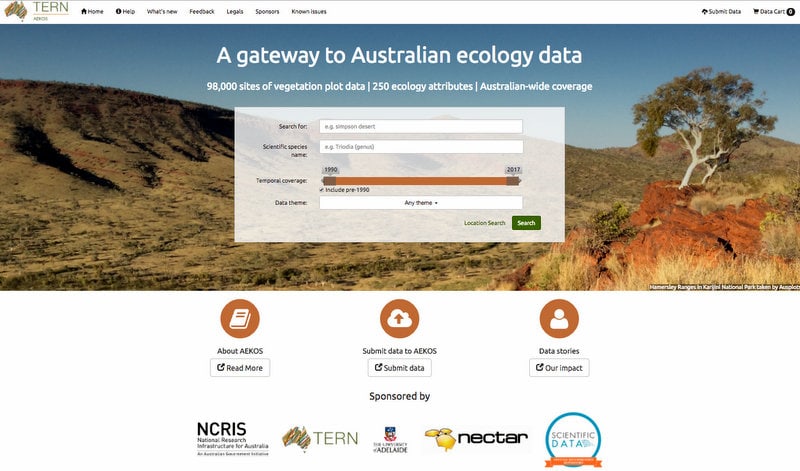In the first quarter of 2017 over a trillion data records were downloaded via TERN’s AEKOS data portal. These data and our trusted services that deliver them continue to support and extend Australia’s higher education and research sector enabling it to operate more openly, collaboratively, efficiently and effectively—an achievement a trillion times more valuable than the statistic.
TERN’s Advanced Ecological Knowledge and Observation System (AEKOS) is your gateway to Australian ecology data. AEKOS is a world-leading ecosystem data service that provides open access to huge amounts of previously unavailable scientific data to support and extend terrestrial ecosystem science, education and management.
TERN AEKOS currently makes openly available high quality, scientific survey data from over 95,000 sites; over 1,000 surveys with complete metadata; and Australia-wide in-situ species and environment data. It also houses a large number of critical state and territory government survey and monitoring datasets.
A trillion downloads: AEKOS builds research and education capacity
TERN AEKOS and its data products are being used by some of Australia’s most successful ecosystem scientists, spread across many universities and institutions. TERN’s trusted services support and extend Australia’s higher education and research sector enabling it to operate more openly, collaboratively, efficientely and effectively.
In fact, more than $8.5 million worth of the ARC Discovery projects funded over the past four years rely on components of the collaborative research infrastructure delivered through TERN.
Our lead story in this month’s newsletter is a prime example of how TERN data is enabling Australian researcher participation in global science projects. The data stored in AEKOS was integral in enabling an international team, led by the UN’s FAO, in identifying and measuring 467 million hectares of dryland forest.
Other examples include Australian researchers, teachers and students, using data stored in AEKOS to:
- understand past climates;
- identify biodiversity hotspots and their threats; and
- identify drivers native vegetation declines and where ongoing monitoring and conservation efforts should be focused.
Professor Glenda Wardle of the University of Sydney and Australia’s Ecosystem Science Council is not only using AEKOS but also introducing it to students and recommending its services to colleagues.
“AEKOS is a fantastic open data resource for researchers and land managers,” says Glenda.
“I use it in teaching students about the importance of keeping good data records so that hard-earned biodiversity data can be well-described and meet the high standards for data reuse.”
“Most importantly, I recommend they use it in their research projects, to demonstrate how they can benefit directly as both data providers and data re-users.”
Even from just a handful of examples, the power of TERN’s data services in strengthening Australia’s research capacity is impressive.
TERN services support research culture shift towards data citation
AEKOS not only permits storage, preservation and access to the full richness of species and environment data, including collection methodologies and photopoint data, it also facilitates data publishing for fitness of purpose and citation.
Data are published transparently with detailed data descriptions and acknowledgements to data authors following ethical research practices and international FAIR publishing principles.
In recognition of AEKOS’s trusted data, it is one of the few data repositories (12%) recommended by leading journals globally, including Nature, for archiving data in the Biosharing database catalogue.








